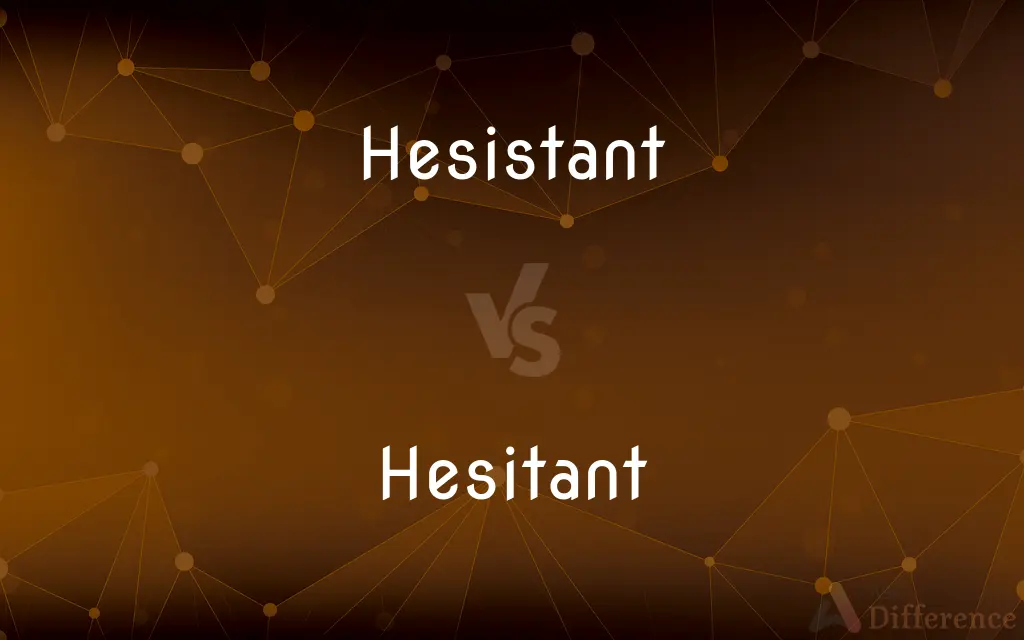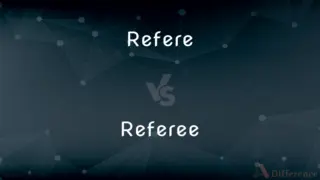Hesistant vs. Hesitant — Which is Correct Spelling?
By Tayyaba Rehman — Updated on March 25, 2024
"Hesistant" is a common misspelling. The correct spelling is "hesitant," meaning showing reluctance or uncertainty.

Table of Contents
Which is correct: Hesistant or Hesitant
How to spell Hesitant?

Hesistant
Incorrect Spelling

Hesitant
Correct Spelling
ADVERTISEMENT
Key Differences
Recall "tent" as in "hesi-TENT," not "tants."
Use mnemonic: "HESI-TANT = He Shows Indecision, Tentatively Avoiding Next Tasks."
Remember there's only one "s" after the "e" in "hesitant."
Associate with the phrase: "He's hesitant," emphasizing the single "s."
Think of the word "hesitate" – drop the "e" and add "ant."
ADVERTISEMENT
How Do You Spell Hesitant Correctly?
Incorrect: She felt hesistant to ask for a raise.
Correct: She felt hesitant to ask for a raise.
Incorrect: He seemed very hesistant to give his opinion.
Correct: He seemed very hesitant to give his opinion.
Incorrect: She was hesistant to accept the invitation.
Correct: She was hesitant to accept the invitation.
Incorrect: They were hesistant to invest in the new project.
Correct: They were hesitant to invest in the new project.
Incorrect: I'm hesistant about making such a big decision.
Correct: I'm hesitant about making such a big decision.
Hesitant Definitions
Uncertain; unsure.
They were hesitant about the outcome.
Displaying reluctance to proceed.
He was hesitant about the risky investment.
Tentative in action or speech.
His hesitant response raised eyebrows.
Showing lack of certainty or confidence.
She was hesitant to answer.
Slow to act due to fear or indecision.
He was hesitant in a dangerous situation.
Inclined or tending to hesitate.
Tending to hesitate, wait, or proceed with caution or reservation.
I am hesitant to recommend him as a manager because he has a short temper.
Not prompt in deciding or acting; hesitating.
Unready in speech.
Lacking decisiveness of character; unable to act or decide quickly or firmly;
Stood irresolute waiting for some inspiration
Acting with uncertainty or hesitance or lack of confidence;
A groping effort to understand
Hesitant Meaning in a Sentence
He was hesitant to share his true feelings.
I'm hesitant to buy a car without test-driving it first.
They were hesitant to change the team's strategy.
The dog was hesitant to enter the water.
He seemed hesitant to accept the job offer.
She felt hesitant about moving to a new city.
She was hesitant to speak up during the meeting.
They were hesitant to go out in the storm.
He was hesitant to take on the new project.
I was hesitant to try the new restaurant in town.
They felt hesitant to invest more money.
He was hesitant to try sushi for the first time.
He's hesitant to ride the roller coaster.
They were hesitant to sell their old house.
I was hesitant to join the gym without a trial period.
She was hesitant to travel alone.
She was hesitant to cut her hair short.
He was hesitant about attending the reunion.
I'm hesitant to lend out my favorite books.
They were hesitant to adopt a pet.
She was hesitant about changing her major.
I'm hesitant to give my opinion on such a sensitive topic.
She's hesitant to make new friends.
I was hesitant to watch the movie because of its reviews.
She's hesitant to try new foods.
Common Curiosities
What is the pronunciation of Hesitant?
Hesitant is pronounced as /ˈhɛz.ɪ.tənt/.
Why is it called Hesitant?
The term "hesitant" comes from the verb "hesitate," denoting a lack of decisiveness.
What is the verb form of Hesitant?
The verb form is "hesitate."
Which preposition is used with Hesitant?
"About" or "to" can be used, as in "hesitant about" or "hesitant to."
Is Hesitant an adverb?
No, it's not an adverb.
What is the root word of Hesitant?
The root word is "hesitate."
Which vowel is used before Hesitant?
Context is required, but commonly no vowel precedes "hesitant."
What is the singular form of Hesitant?
"Hesitant" is singular.
Which conjunction is used with Hesitant?
Conjunction use is contextual; "and" can be used.
Is Hesitant a noun or adjective?
"Hesitant" is an adjective.
What is the plural form of Hesitant?
"Hesitant" is an adjective and doesn't have a plural form.
Which article is used with Hesitant?
Both "a" and "the" can be used depending on context.
Is Hesitant an abstract noun?
No, it is an adjective.
Is Hesitant a vowel or consonant?
"Hesitant" is a word containing both vowels and consonants.
What is the second form of Hesitant?
Again, it's an adjective and doesn't have verb forms.
How many syllables are in Hesitant?
There are three syllables.
Is Hesitant a collective noun?
No, it isn't.
Is the Hesitant term a metaphor?
Not by itself, but can be used metaphorically.
What is a stressed syllable in Hesitant?
The first syllable, "hesi," is stressed.
What part of speech is Hesitant?
"Hesitant" is an adjective.
What is another term for Hesitant?
"Reluctant" can be a synonym.
What is the first form of Hesitant?
As an adjective, "hesitant" doesn't have verb forms.
Is Hesitant a negative or positive word?
Neutral, but often carries a slightly negative connotation due to its association with indecision.
Is Hesitant a countable noun?
No, as it's an adjective.
Is the word Hesitant imperative?
No, it's not.
What is the opposite of Hesitant?
"Confident" or "decisive."
Which determiner is used with Hesitant?
"It" or "this" can be used, depending on the context.
What is the third form of Hesitant?
"Hesitant" remains unchanged, as it's an adjective.
How do we divide Hesitant into syllables?
Hesi-tant.
How is Hesitant used in a sentence?
"He was hesitant to make the big decision without more information."
Share Your Discovery

Previous Comparison
Refere vs. Referee
Next Comparison
Aquainted vs. AcquaintedAuthor Spotlight
Written by
Tayyaba RehmanTayyaba Rehman is a distinguished writer, currently serving as a primary contributor to askdifference.com. As a researcher in semantics and etymology, Tayyaba's passion for the complexity of languages and their distinctions has found a perfect home on the platform. Tayyaba delves into the intricacies of language, distinguishing between commonly confused words and phrases, thereby providing clarity for readers worldwide.



































